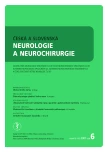Does the Development of Urinary Dysfunction in Multiple Sclerosis Depend on the Type of Neurological Treatment?
Authors:
L. Zámečník 1; K. Novák 1; V. Soukup 1; E. Havrdová 2; I. Nováková 2; D. Horáková 2
Published in:
Cesk Slov Neurol N 2007; 70/103(6): 687-691
Category:
Short Communication
Práce byla podpořena grantem IGA MZ ČR 8188-3.
Overview
Multiple sclerosis (MS) is an auto-immune disease of the central nervous system. The course of the disease is benign (remittent) in 10 to 15 % of patients, but the degree of vesicouretral dysfunction does not correlate with a relatively favourable neurological finding. Difficult micturition usually correlates with the degree of spastic paraparesis in the lower limbs. The objective of the prospective study was to assess the potential positive effect of neurological treatment with beta interferon on urinary dysfunction as compared with combined immunosuppressive therapy in patients with the same form of MS. The group consisted of 98 patients with the remittent form of MS monitored from June 2002 to August 2006. Fifty patients were receiving combined immunosuppressive therapy, 48 patients were treated with first-choice drugs. Based on urological and urodynamic examinations, the lower urinary tract dysfunction was treated according to generally accepted standards. The duration of the disease, the disease status at inclusion in the study, the trend in the neurological status during monitoring, the length of dysfunction of the lower urinary tract at inclusion in the study, the basic values of the initial and control urological examination, the type of dysfunction of the lower urinary tract, the urodynamic findings at baseline and during the follow up, the degree of post-micturition residual volume, as well as the subjective evaluation of the „success of the urological treatment“ were evaluated. No evidence of statistically significant improvement on the EDSS or in the quality of life was found in patients treated with first-choice drugs. Long-term follow up of such patients has shown a statistically significant decrease in the values of post-micturition residual volume and also their subjective perception of the urological treatment has become more positive. First-choice therapy appears to be much better from the viewpoint of the prognosis for the dysfunction in the framework of the follow up of the incidence of the lower urinary tract disorder and of urological infection. Post-micturition residual volume has a crucial impact on the quality of life. None of the above therapies has shown dependence of any of the criteria on patient age.
Key words:
multiple sclerosis – micturition difficulty – interferon – remittent form
Sources
Araki I, Matsui M, Ozawa K, Takeda M, Kuno S. Relationship of bladder dysfunction to lesion site in multiple sclerosis. J Urol 2003; 169 : 1384-1387.
2. Betts C, D´Mellow M, Fowler C. Urinary symptoms and the neurological features of bladder dysfunction in multiple sclerosis. J Neurol Neurosurg Psychiatry 1993; 56 : 245.
3. Nijeholt GJ, van Walderveen MA, Castelijns JA, van Waesberghe JH, Polman C, Scheltens P et al. Brain and spinal cord abnormalities in multiple sclerosis. Correlation between MRI parameters, clinical subtypes and symptoms. Brain 1998; 121 : 687-697.
4. Di Benedetto P, Giorgini T, Delneri C, Biasutti E. Pathophysiology of urinary dysfunction in multiple sclerosis. Neurol Sci 2006; 27(Suppl 4): s320-322.
5. Nováková I, Zámečník L, Havrdová E, Tichá V. Mikční obtíže u pacientů s roztroušenou sklerózou mozkomíšní. Česk Slov Neurol N 2001; 64/97 : 366-369.
6. Tomassini V, Paolillo A, Russo P, Giugni E, Prosperini L, Gasperini C et al. Predictors of long-term clinical response to interferon beta therapy in relapsing multiple sclerosis. J Neurol 2006; 253 : 287-293.
7. Zámečník L, Novák K, Hanuš T, Nováková I, Havrdová E. Urologické obtíže u roztroušené sklerózy - diagnostika a terapie. Ref Výb z Urol 1998; 6 : 242-248.
8. Zachoval R, Pitha J, Medova E, Heracek J, Lukes M, Zalesky M et al. Augmentation cystoplasty in patients with multiple sclerosis. Urol Int 2003; 70 : 21-26.
Labels
Paediatric neurology Neurosurgery NeurologyArticle was published in
Czech and Slovak Neurology and Neurosurgery

2007 Issue 6
-
All articles in this issue
- Facial Palsy
- Electrophysiological Examination of the Facial Nerve
- Antibodies Against Glycoconjugates in the Diagnosis of Autoimmune Neuropathies
- 5 Years of Activities of the National Reference Laboratory for Human Prion Diseases Attached to the Department of Pathology and Molecular Medicine of FTNsP: Our Experience and an Overview of Literature
- A Clinical Approach to Computed Tomography in Acute Cerebral Ischemia
- Ultrasound Evaluation of Substantia Nigra in Patients with Parkinsonian Syndromes
- Comparison of Results of Measurement of Visual Evoked Potentials in Patients with Multiple Sclerosis and Neuroborreliosis
- Cognitive Evoked Potentials – the P300 Wave in Patients with Sclerosis Multiplex: Relation to the Form of the Disease, Somatic Affection and Quality of Life
- Swallowing Disorders Related to Vertebrogenic Dysfunctions
- Central Neurocytoma: Case Report and Review of the Literature
- Gelastic Seizures in Hypothalamic Hamartoma: a Case Study
- Dercum’s Disease (Lipomatosis Dolorosa) – a Rarely Diagnosed Disease: a Case Study
- Post-traumatic Olfactory Disorders: Case Studies
- Cerebral Venous Thrombosis in the Users of Hormonal Contraceptives
- Successful Use of a Single Question in Restless Legs Syndrome Screening in the Czech Republic
- Does the Development of Urinary Dysfunction in Multiple Sclerosis Depend on the Type of Neurological Treatment?
- Relapsing-remitting Multiple Sclerosis and Oligoclonal Band Pattern During Disease Modifying Drug Therapy
- Czech and Slovak Neurology and Neurosurgery
- Journal archive
- Current issue
- About the journal
Most read in this issue
- Facial Palsy
- Swallowing Disorders Related to Vertebrogenic Dysfunctions
- Antibodies Against Glycoconjugates in the Diagnosis of Autoimmune Neuropathies
- Dercum’s Disease (Lipomatosis Dolorosa) – a Rarely Diagnosed Disease: a Case Study
